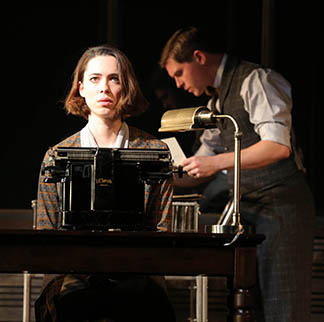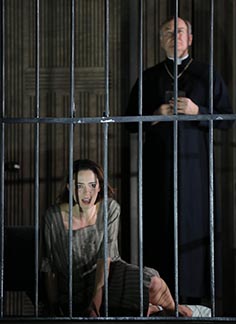By Lucy Komisar
A woman is trapped in a system, caught in a machine (machinal, from the French of or pertaining to machines), that turns her into a victim any way she looks, whether she accepts her plight or fights it. Sophie Treadwell‘s powerful and inventive play is a feminist treatise about women forced into marriage and then self-destruction, because they have no alternatives. It‘s a stunning drama, given a rich, subtle, moving performance by British actor Rebecca Hall in this Roundabout Theatre Company revival.
Treadwell, who most of us haven‘t heard of (why not?), an extraordinary sophisticated woman for her time or any time, wrote this play in 1928, and it was produced at the time in New York to rave reviews and not seen since on Broadway. It was inspired by the execution that year of Ruth Snyder for the murder of her husband. Treadwell, a journalist who covered murder trials and was also a playwright, wonders and imagines why.

The play is painful but also invigorating, because it is so stylized, naturalism replaced by an almost musical rhythm, staccato repetitions, visual slow-motion and shadowy movements all designed by director Lyndsey Turner. (Choreography is by Sam Pinkleton).
The events occur in from New York 1922 to 28. Women had just gotten the right to vote, but not much else. The “young woman” (how she is defined, though we learn her name is Helen) is a feminist everywoman. Helen (Rebecca Hall) is pressed, maybe groped, in a subway car full of men. She flees the car and then arrives distraught, late, at the office where the clatter of a typewriter and adding machine, the shrill talk of the phone operator, create a weird cacophony, like the clanging in a factory. To add to the sense of violated humanity, the company executives are called by only initials.

One of them, the man who pursues her, is J. (Michel Cumpsty), an officious vice president of the George H. Jones Company. Cumpsty is perfect in the role, exuding self-importance. At home with her mother (the very good Suzanne Bertish), Helen sits at a plain wood table covered with cheap stuff, maybe oil cloth, in a kitchen with an old sink.
Her resentment sputters as her mother presses her with guilt. When she mentions “J‘s” attentions, her mother urges her to marry him. “He‘s a decent man, he‘s a VP.” He has money.
Helen gives in, largely out of despair of what will become of her. But she recoils at his touch. J in the play is referred to from then as “Husband.” The “young woman” gets a “husband.” She becomes Mrs. Jones.
In terrific hotel scene (sets by Es Devlin), she stands tall, with tiara and veil, repeating phrases that describe her despair. Hall shows her as sensitive, sometimes na¯ve. Her husband is crude, telling her mildly risqué jokes. He is pretentiously materialistic: “All my life I‘ve wanted a Swiss watch — that I bought right there.” On their wedding night, she comes out of the bathroom in her slip, crying. Through the window one sees stylized dancers; he tells her to pull the shade.

She has a baby and, lying in a white metal hospital bed, she declares, “I‘ll not submit any more.” Her thoughts are stream of consciousness.
“ Let me alone – let me alone – let me alone – I‘ve submitted to enough – I won‘t submit to any more – crawl off – crawl off in the dark…. – climb those golden stairs – stairs – stairs – climb – tired – too tired – dead – no matter – nothing matters – dead – stairs – long stairs – all the dead going up – going up – to be in heaven – heaven …. – I‘ll not submit any more – I‘ll not submit – I‘ll not submit –

So comes rebellion. The office phone operator (an excellent Ashley Bell) takes her to a speakeasy where she meets an attractive, laid-back guy (Morgan Spector), called only “Lover.”
He is an American, living in Mexico. Treadwell wrote about the Mexican Revolution and interviewed Pancho Villa. He tells her how he‘d killed a man when he was held captive by “bandidos.” He said, “I had to get free.” It‘s a leitmotif.

With him, suddenly she is happy, feels hope. She is ethereal. The play turns into film noir. Or maybe it‘s always been that.
Back with her husband, all is dreary. She feels stifled. He reads the business pages. She reads about women‘s troubles. He is thrilled that he obtained a mortgage on a property. It is unspoken that he has mortgaged her.
Somewhat later, we see her in prison for the murder of J. The only time we hear her name spoken is at the trial: “The People of the State of New York versus Helen Jones.”
A comic note is Treadwell‘s depiction of two (male) reporters sitting on both sides of the slanted journalism fence.

FIRST REPORTER: (writing) Under the heavy artillery fire of the State‘s attorney‘s brilliant cross-question, the accused woman‘s defense was badly riddled. Pale and trembling she –
SECOND REPORTER: (writing) Undaunted by the Prosecution‘s machine-gun attack, the defendant was able to maintain her position of innocence in the face of rapid-fire questioning that threatened, but never seriously menaced her defense. Flushed but calm she –
But the result was easily predicted.
This is a play that anyone interested in American theater should see – especially given its origin in the 1920s — both for its powerful theme and for its very inventive, original style. A milestone in feminist theater.
˜Machinal.” Written by Sophie Treadwell; directed by Lindsey Turner. Roundabout Theatre Company, 227 W. 42nd Street, New York City. 212-719-1300. Opened Jan 16, 2014; closes March 2, 2014. (2/5/14) On NY Theatre Wire.

